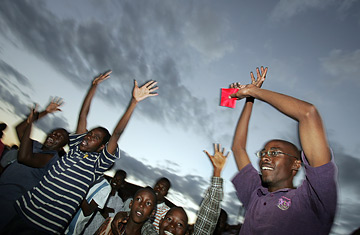
Supporters of Movement for Democratic Change celebrating southwest of Harare.
Zimbabwe was holding its breath as the opposition Movement for Democratic Change (M.D.C.) declared it had defeated President Robert Mugabe in this weekend's general election. Holding its breath because elections in Zimbabwe are not normal elections. By the time initial official results were announced in an early morning broadcast on Monday, the Electoral Commission said the parliamentary seats that had been counted so far were split between the M.D.C. and Mugabe's ruling party. The M.D.C. are claiming that they're leading with 60% of the votes compared to 30% for Mugabe. Reporters were told by the M.D.C. on Monday that this gave them 96 seats in the House of Assembly. A party official said the results were based on vote counts posted on polling stations for 128 of the Assembly's 210 seats.
In an early morning nationwide broadcast on radio and television Monday, deputy chief elections officer Utoile Silaigwana declared results for six parliament seats — three for Mugabe's ruling party, three for the opposition. Then he went off the air, saying, "We'll be back with you when we have more results."
Four hours later, the commission announced results for another 18 parliament seats — nine each for the ruling and opposition parties. Those results included Justice Minister Patrick Chinamasa losing his seat in a former ruling party rural stronghold.
In advance of the joint presidential and parliamentary poll on Saturday, the head of the army declared it would not support anyone but Mugabe. All but a few foreign observers and journalists were refused entry. The M.D.C. said it had information that the regime had printed around 3.5 million extra ballot papers, and calculated that the presumed resultant rigging would result in a Mugabe victory. What's more, the M.D.C. has announced leads in previous elections, only to be reversed by later, regime-official counts.
At a Harare press conference Sunday, M.D.C. secretary general Tendai Biti announced, on the basis of predominantly urban results already in, a sweeping vote for his party, which is led by former trade unionist Morgan Tsvangirai. "We have won this election," said Biti. "The trend is irreversible." He said he was passing on results already posted publicly at local polling stations. Before announcing results Monday morning, the Zimbabwe Electoral Commission, which will collate the vote centrally, has demanded the police arrest those announcing regional results before it announces the national result. "Can you arrest someone because he is just repeating what has already been confirmed to be public information?" asked Biti in response.
Zimbabwe is not North Korea. There is only so much rigging that can be done in what the regime wants to ensure appears like a democratic exercise. So the M.D.C.'s move should be seen as a pre-emptive tactical one. It hopes to make blatant what it alleges will be widespread rigging should Mugabe eventually be declared the winner. Or, by announcing the results of urban areas — where it has most support — it hopes to build momentum, in order make any possible rigging difficult, or at least conspicuously unpopular.
There is little doubt that with an inflation rate of more than 100,000%, unemployment of 80% and life expectancy that has plunged to the mid-30s, those Zimbabweans who remain in the country — an estimated 2 to 3 million have left — are unhappy with the direction of the economy. Mugabe blames a Western conspiracy for that, and says the M.D.C. is a Western stooge. But the signs are that increasingly few are listening. Mugabe's own party, the Zanu-PF, has begun to splinter underneath him — his other main challenger is Simba Makoni, a former finance minister. And the unfettered and peaceful campaigning that the M.D.C. and Makoni have enjoyed in the past few weeks has raised doubts about whether Mugabe still commands the loyalty of the security forces, who have violently repressed any opposition in the past.
Normally everything would depend on the official results. In Zimbabwe, it also depends on Mugabe's reaction. While awaiting the remaining results, the nation has no news on when either might arrive.
